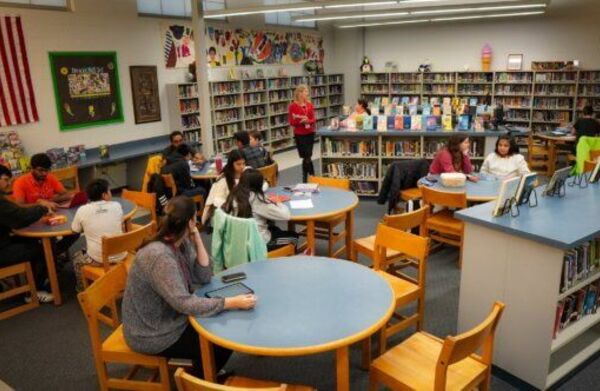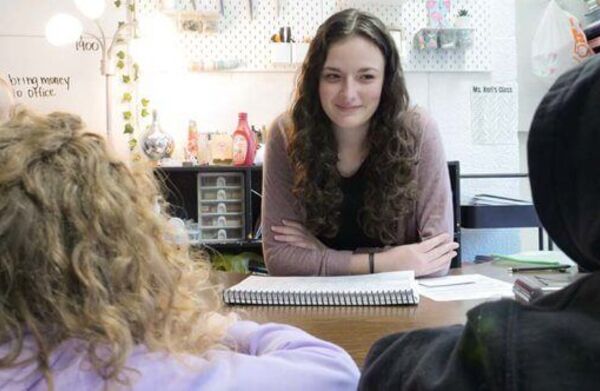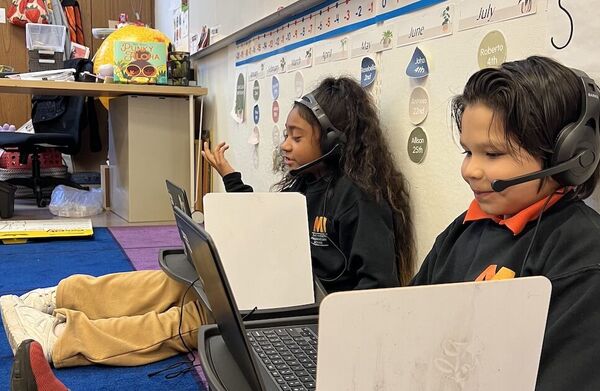Posted on
How rewarding service while learning makes teacher prep more accessible
Category: Policy and Advocacy
This story is part of a series lifting up policy solutions to foster more affordable and high-quality pathways into teaching. A full policy report will be released in September. Subscribe for updates
For University of Southern California senior Denise Gutierrez, finding out that she had Federal Work-Study (FWS) was a massive weight off her shoulders.
“It took a lot of stress off me because obviously not having the money to go to college is a huge thing,” Gutierrez said.
She’s far from alone. The vast majority of U.S. students (87.3%) accept financial support to get to and through college, with the average financial aid package at $15,480.
Aspiring educators have additional options: federal loan forgiveness programs like Teacher Loan Forgiveness (TLF) and Public Service Loan Forgiveness (PSLF) can help offset the costs of becoming a teacher, often paired with TEACH grants and broader support such as Pell grants and FWS.
But too often, these financial supports aren’t enough. The latest available National Teacher and Principal Survey data show that the average student loan debt for a bachelor’s degree is nearly $30,000, and teachers earn on average 26.6% less than similarly educated professionals. As a result, many would-be educators opt out entirely, while others turn to more affordable routes – some of which may be less rigorous – or enter classrooms without full certification.

Addressing who gets access to strong preparation is critical to building a stable, effective, and representative teacher workforce. States and teacher-preparation programs are exploring solutions that reduce costs while maintaining instructional quality. Registered teacher apprenticeships, paid residencies, and some scholarships allow aspiring teachers to gain hands-on experience while getting compensated for their labor.
In particular, leaders across the country have turned to embedding high-impact tutoring, a proven investment for both aspiring educators and PK-12 students, as an important paid component of an educator-preparation program.
Early, low-barrier exposure to the realities to teaching
At the height of the pandemic, American University (AU) in Washington, D.C. partnered with CityTutorDC and local school districts to recruit and pay tutors to work with students in low-income neighborhoods. Seeing the positive impact on both students and aspiring educators, then-Dean Cheryl Holcomb-McCoy asked Director of Undergraduate Education Ocheze Joseph to explore the possibility of embedding tutoring into undergraduate teacher education coursework.
Joseph jumped at the opportunity, as she saw the confidence and skill-building that tutoring experiences provided to aspiring educators. She embedded tutoring into a required service-learning course for these future teachers and expanded AU’s partnerships with DC’s schools and Office of State Superintendent of Education (OSSE). As a result, the AU Future Teacher Tutors program launched in 2021, providing aspiring educators with 40 hours of tutoring experience prior to student teaching, while offering an hourly rate and transportation stipends. As a result, aspiring educators could gain real-world teaching exposure early in their preparation experiences and confirm that teaching is the right path for them, with minimal financial costs.

While funding has shifted since its launch, Joseph is continuously committed to ensuring that the program is supporting aspiring educators to gain early practice experiences without cost being a prohibitive expense.
Making the system work better for aspiring educators across the country
While AU demonstrates what can be done locally, a program on the other side of the country has scaled a similar approach to reach more aspiring educators. Step Up Tutoring, a nonprofit tutoring organization, launched a FWS program with a Los Angeles higher education institution and has expanded to more than 40 colleges and universities across the country to leverage FWS funds for tutoring. This includes the University of Southern California, where Gutierrez studies.
For some university partners, allocating these funds was straightforward; for others, it required restructuring financial aid procedures and establishing systems for recruiting, training, and placing tutors. Step Up makes it easy for students to access meaningful, paid opportunities in education.
Bryce Savoy, another USC student, shared: “Work-study is a part of the financial aid that USC gives us, but my first year, I had work study, but I didn't actually get a job. So from their perspective, it's like I didn't use it, but I wanted to.”

By connecting students to paid tutoring roles early, Step Up not only offsets educational costs but also builds a pipeline of future teachers. Even tutors who didn’t initially plan to become teachers find the experience transformative: 82% of Step Up high school and college tutors report feeling more likely to consider a career in education or working with youth.
Sam Olivieri, CEO of Step Up, emphasizes that removing logistical barriers is key to making teaching more accessible:
With targeted investments and smart policy design, states and the federal government can ease financial burdens for teacher-candidates to opt into high-quality pathways and support all students with rigorous and affirming learning experiences.
A preview from our forthcoming policy report:
How are we making high-quality pathways more affordable and supportive?
State and federal leaders should champion policies that:
Program Approval & Regulation
Require EPPs, PK-12 schools, and other relevant community organizations to establish partnerships aimed at reducing the total cost (e.g., tuition, fees, living expenses) of becoming a teacher
Funding:
- Establish and fund scholarship, grant, and loan forgiveness programs to increase the number of teachers in the teacher workforce, as well as improve attainment rates and forgiveness amounts for public service loan forgiveness
- Subsidize or remove fees (e.g. the cost of licensure assessment(s) and background checks) for entry into the profession
- Assist prospective educators to overcome transportation and childcare barriers to beginning and/or completing high-quality pathways
Convening Power
- Improve structures and quality of guidance provided to PK-12 schools and EPPs on shifts in funding opportunities and policy that intend to make teaching more affordable and supportive
- Partner with EPPs and PK-12 schools to align policies and funding incentives to coursework, clinical, and classroom realities (e.g. course schedules, academic calendars vs. fiscal calendars)
Our new policy report summarizes insights from our work with educator-preparation programs, leaders, and policymakers over the last 10 years on how to advance and implement policies that foster instructionally-focused, practice-based, accessible, and innovative & responsive pathways into teaching across all 50 U.S. states and D.C. Subscribe to our newsletter to download the full report when it releases in September.
Learn More
We offer strategic advising to teacher-preparation programs and state education agencies to develop and implement policies that strengthen pathways into teaching. Get in touch:
Related Stories

Blog
From tutor to teacher: how Illinois’s state tutoring program is building local pathways into teaching
In a brightly-lit corner of the library at Rochelle Middle School, aspiring math teacher Angie...
March 09, 2023


Blog
How a tutoring organization in California builds partnerships and empowers future educators using FWS
Step Up Tutoring partners with 16 colleges and universities to leverage Federal Work-Study.
April 02, 2024


